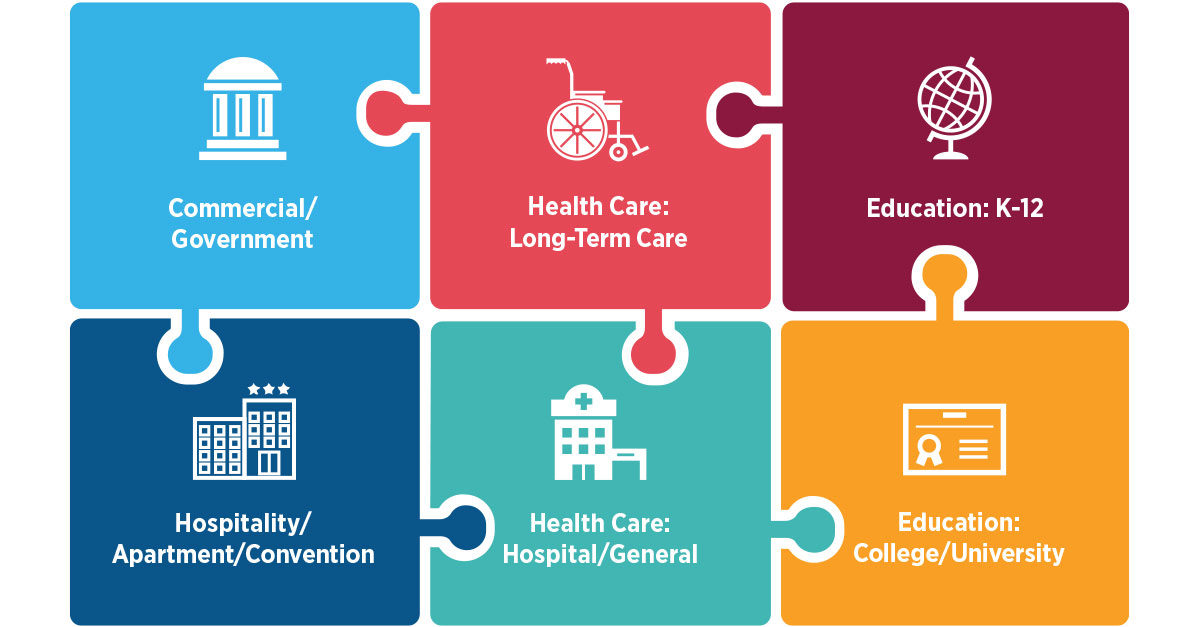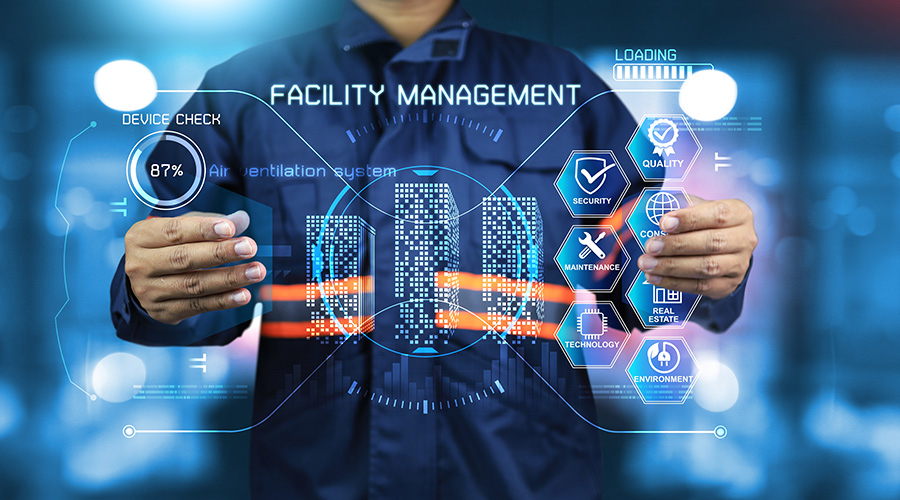Facility Management-- Crucial Providers for Effective Operations
Facility Management-- Crucial Providers for Effective Operations
Blog Article
Key Fads Forming the Future of Facility Management in 2024
As we expect 2024, the landscape of center monitoring is positioned for significant transformation, driven by numerous essential fads. The assimilation of smart building modern technologies and a shift towards data-driven decision-making guarantee to enhance functional effectiveness while focusing on sustainability in technique. The appearance of hybrid work versions is reshaping workplace settings, requiring innovative style services that cater to evolving employee demands. In the middle of these changes, the concentrate on passenger health remains to get traction, underscoring the significance of a healthy and balanced work environment. How these trends will manifest in technique stays an important concern for market experts.
Smart Structure Technologies

Smart structure innovations encompass a wide selection of systems, consisting of intelligent lighting, a/c controls, and safety systems. By integrating these systems, center managers can keep track of and change specifications in real-time, leading to considerable decreases in power waste and functional costs. Smart sensing units can discover occupancy levels and change lighting and temperature level appropriately, ensuring that energy is just made use of when needed.
In addition, these technologies facilitate improved information collection, allowing companies to track usage patterns and determine chances for additional enhancements. The execution of clever structure technologies not only adds to sustainability objectives but also creates much healthier work settings that can improve staff member efficiency and fulfillment.
As we move into 2024, the fostering of wise building technologies will likely accelerate, reflecting a broader change in the direction of even more intelligent, receptive, and lasting center management practices.
Data-Driven Decision Making
Increasingly, organizations are leveraging data-driven decision making to boost center management techniques. By utilizing data analytics, facility supervisors can obtain actionable understandings that dramatically improve operational effectiveness and source allocation. The integration of sophisticated modern technologies, such as IoT sensors and real-time monitoring systems, makes it possible for the collection of vast quantities of information on building performance, occupancy prices, and power intake.
This wide range of information enables facility managers to recognize trends, forecast maintenance needs, and proactively address problems prior to they intensify. Predictive analytics can anticipate tools failures, reducing downtime and repair work prices. Additionally, information visualization devices help with much better communication amongst stakeholders, ensuring that informed decisions are made collaboratively.
Moreover, data-driven strategies improve calculated planning by enabling facility managers to evaluate the effectiveness of present techniques and make informed choices concerning investments in modern technology or framework. As companies increasingly focus on functional excellence, data-driven decision production is positioned to become a cornerstone of successful facility administration strategies in 2024 and beyond. Inevitably, the capability to take advantage of information successfully will encourage companies to create more efficient, efficient, and resistant centers.
Sustainability and Environment-friendly Practices
The focus on data-driven decision making normally straightens with the growing focus on sustainability and environment-friendly techniques within center management. As organizations increasingly focus on ecological obligation, center supervisors are leveraging analytics to maximize resource usage, lower waste, and minimize carbon impacts. This critical strategy makes it possible for the assimilation of energy-efficient systems, such as LED lighting, wise heating and cooling controls, and sustainable energy sources right into facility operations.
In addition, the execution of lasting techniques extends beyond power intake. Center supervisors are advertising and embracing environmentally friendly materials reusing initiatives to produce a circular economic situation within their facilities. This not only enhances the ecological account of the company yet additionally fosters a society of sustainability amongst workers.
Compliance with ecological laws is another vital element driving the adoption of environment-friendly practices. By utilizing information analytics, facility supervisors can check compliance metrics and recognize areas for renovation, guaranteeing adherence to international and neighborhood sustainability standards.
Hybrid Work Models
A significant change towards hybrid job versions is improving the landscape of center administration in 2024. This paradigm combines in-office and remote job, demanding a reevaluation of space use, resource allotment, and worker engagement approaches. Organizations are increasingly identifying the relevance of adaptable workspaces that satisfy varied needs and preferences.
Center supervisors should adjust by implementing flexible workplace styles that support collaborative initiatives while supplying locations for focused work. This consists of the integration of technology to help with smooth interaction and cooperation among remote and in-office staff members. Smart structure services, outfitted with sensing units and analytics, enable real-time tracking of room usage, allowing companies to enhance their atmospheres effectively.
In addition, hybrid work models highlight the need for effective center administration that prioritizes employee experience. This encompasses not only innovation and space layout but likewise the development of policies that advertise a well balanced work-life dynamic. As firms browse this transition, the duty of center management comes to be pivotal in producing a nimble work environment that cultivates efficiency and drives business success. Basically, the crossbreed job version is changing facility administration, urging a proactive method to satisfy the progressing needs of the labor force.
Improved Occupant Wellness
As companies embrace hybrid work versions, an enhanced emphasis on owner health is ending up being important to center administration techniques. Facility Management. This shift recognizes that a healthy and balanced and completely satisfied workforce directly influences performance and retention Continue rates. Center managers are now prioritizing atmospheres that advertise physical and mental health, incorporating aspects such as natural lights, biophilic design, and available wellness resources
Innovation plays an essential function in this development. Smart structure systems can keep track of environmental elements and adjust setups in real-time, making sure optimum comfort levels - Facility Management. Furthermore, responses mechanisms, such as occupancy sensing units and employee surveys, enable facility supervisors to continuously fine-tune wellness campaigns based on resident demands.

Final Thought
In 2024, the future of center management will be dramatically influenced by the integration of wise building technologies and data-driven decision-making, fostering enhanced operational efficiency. Sustainability efforts will certainly prioritize environment-friendly practices, while the emergence of hybrid job designs will require flexible workplace designs. Moreover, an increased concentrate on resident wellness with innovative HVAC systems and biophilic style will add to much healthier workplace. These patterns jointly underscore the developing landscape of facility administration in feedback to modern challenges and chances.
Facility supervisors are advertising and adopting green materials recycling efforts to create a circular economy within their centers.A considerable change towards hybrid work versions is improving the landscape of center administration in 2024.Moreover, crossbreed job designs emphasize the requirement for effective facility try this administration that prioritizes staff member experience.As organizations accept hybrid job models, an enhanced focus on passenger wellness is coming to be essential to center administration methods.In 2024, the future of facility administration will be considerably influenced by the integration of wise building innovations and data-driven decision-making, cultivating boosted functional effectiveness.
Report this page